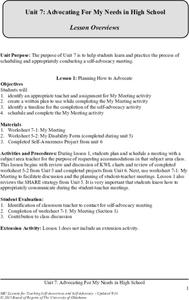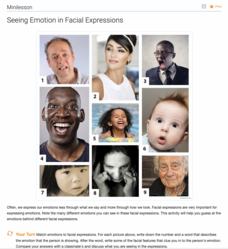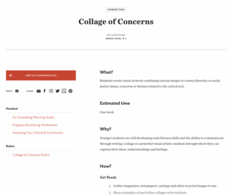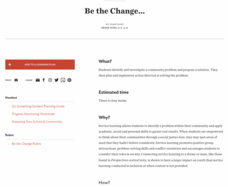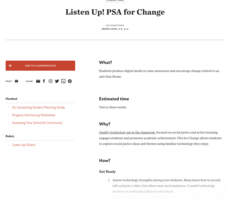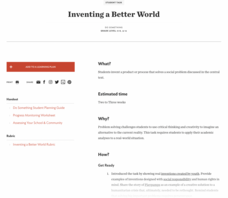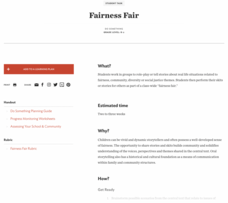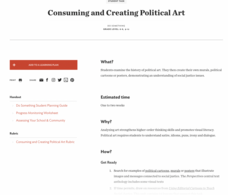University of Oklahoma
Advocating For My Needs in High School
High schoolers enrolled in resource and special needs classes learn and practice how to schedule and conduct a self-advocacy meeting with a teacher to request accommodations in that subject area class. In lesson one they review and...
University of Oklahoma
Increasing My Self-Awareness
After watching a PowerPoint about famous people with disabilities, class members begin a Self-Awareness research project about their own abilities and disabilities. Included in the project is information about people who have similar...
University of Oklahoma
Understanding My Individualized Education Program
The final unit the series helps learners become familiar with the major components and vocabulary in their IEPs. Using a KWL chart, class members record information about their IEPs and set goals for themselves.
University of Oklahoma
Getting Started
"Getting Started" is a two-lesson unit focused on familiarizing high schoolers with the concepts of self-awareness and self-advocacy. Learners identify their strengths and weaknesses, likes and dislikes in a ME: Book that they will use...
Thoughtful Learning
Taking Action Against Bullying
A mini-lesson offers suggestions for young learners on how to take action against bullying, both for themselves and others. Individuals then craft a paragraph about strategies they might use.
Thoughtful Learning
Expressing Emotions Through Drawing
Draw it out! Sometimes creating a picture is an easier way for pupils to express how they are feeling. A short mini-lesson encourages just that approach. After drawing an expressive picture, artists are asked to reflect on their work and...
Thoughtful Learning
Calming Down with Deep Pressure
Stressed out and tensed up! When stressed our bodies tense and our muscles clench. Teach youngsters how to calm down with simple deep pressure exercises. Press and release!
Thoughtful Learning
Seeing Emotion in Facial Expressions
Learning to read body language, especially facial expressions, is the focus of a mini-lesson. Young learners examine a series of photographs, identify the emotion being illustrated, and then discuss the cues that revealed the emotion.
Thoughtful Learning
Understanding the Parts of the Brain
A mini-lesson explains the role the parts of the brain play in thinking and learning. Scholars discover why feeling safe, calm, and connected is essential to learning effectively.
Teaching Tolerance
Community Puzzle Mural
Every piece of the puzzle is important. A lesson gives individuals the opportunity to create artwork that spreads a message of inclusion and tolerance. Class members work in teams to create pieces of the mural that form a larger picture....
Teaching Tolerance
Community Arts Showcase
An art showcase encourages class members to explore the themes of social justice and tolerance. They create an original artwork, engage in group discussions, and journal writing. The art gallery also provides a chance for families and...
Teaching Tolerance
Collage of Concerns
A picture can speak louder than words. An interesting lesson introduces the themes of social justice and diversity to young learners by having them create artwork. Scholars create collages from a variety of sources to showcase what...
Teaching Tolerance
Buddy Share
Here's a project that gives academics the chance to share their opinions on social justice with storytelling, creative writing, or art. Scholars choose what they want to create and are assigned buddies to support their efforts. To...
Teaching Tolerance
Be the Change...
An engaging lesson empowers individuals to make a difference in the community. Pupils work together to identify problems within the community and draft possible solutions. Scholars then take it to the next level by volunteering their...
Teaching Tolerance
Community Mural / Poster Campaign
Every piece matters. A creative lesson provides an opportunity for scholars to create murals or posters that represent their views on social justice. Academics work on smaller posters or pieces of a mural that will ultimately be...
Teaching Tolerance
Artistic Expression Showcase
No one is too young to create a masterpiece. Elementary artists delve into the topic of social justice with original artwork. Scholars keep journals to reflect on their experiences before putting paintbrush to paper. Final artwork is...
Teaching Tolerance
Act Up! Drama for Justice
A lesson turns young historians into playwrights to understand and speak out against social injustice. Pupils work individually or in groups to write and perform monologues that deliver personal messages on social justice. Writers then...
Teaching Tolerance
Listen Up! PSA for Change
Challenge scholars to speak up about a topic by creating a public service announcement or social media blitz about an issue they feel passionate about. Have them research their issues, then decide the best way to take their messages to...
Teaching Tolerance
Inventing a Better World
From play pumps that provide clean water to shoes made from trash, innovators change the world one invention at a time. After researching various inventions, young entrepreneurs develop their own. Extension opportunities include prompts...
Teaching Tolerance
Identity Artifacts Museum
Who are you? It's a simple question, but younger learners have the opportunity to express their complex identities by making artifacts that represent parts of their identities. After engaging in the activity, they share who they are with...
Teaching Tolerance
Fairness Fair
How can we create a more fair world? Chances are, class members have some ideas! After reading a text about fairness, individuals create skits around the ideas of fairness. Extend the learning and make their presentations a...
Teaching Tolerance
Consuming and Creating Political Art
A picture is worth a thousand words, but political art may be worth even more! After examining examples of political cartoons, murals, and other forms of public art, class members create their own pieces to reflect their ideals and...
Thoughtful Learning
Using Perspective Shifting to Imagine History
Imagine what it would have been like to walk from Georgia to Texas! Perspective shifting, a key part of developing social awareness, involves just this sort of imaging. A short mini-lesson asks learners to shift their point of view and...
Thoughtful Learning
Using Perspective Shifting to Understand Others
Being able to see things from another's perspective is an important part of social awareness. A short activity permits scholars to practice perspective-taking, which in turn helps them develop empathy, appreciate diversity, and promote...


